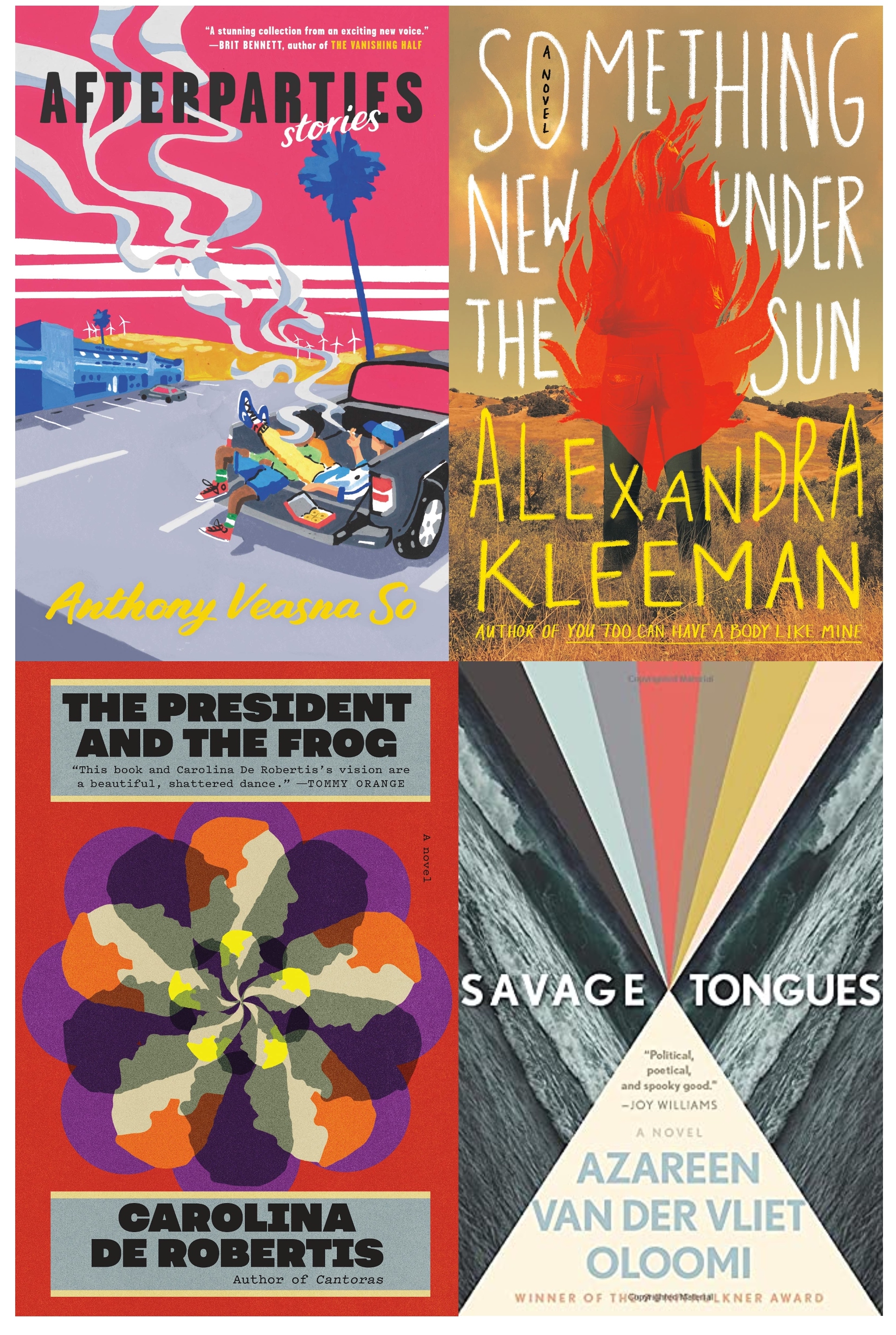Here’s a quick look at some notable books—new titles from the late Anthony Veasna So, Alexandra Kleeman, Mona Awad, and more—that are publishing this week.
Want to learn more about upcoming titles? Then go read our most recent book preview. Want to help The Millions keep churning out great books coverage? Then become a member today.
Afterparties by Anthony Veasna So
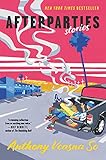 Here’s what Publishers Weekly had to say about Afterparties: “So (1992–2020) conjures literary magic in his hilarious and insightful posthumous debut, a collection that delves into a tightly knit community of Cambodian-American immigrants in California’s Central Valley. Many of the characters are haunted by memories of genocide—one, an Alzheimer’s and dementia nurse in ‘Somaly Serey, Serey Somaly,’ is inhabited by the spirit of a deceased relative who suffered a life of tragedy under the Khmer Rouge. The protagonist of ‘Human Development,’ meanwhile, negotiates his Khmer heritage on a more quotidian level: While at a beer pong–fueled party with his Stanford friends a few years after graduation (‘Why’s the goal of this party to reclaim the culture of closeted frat bros?’ he asks), he messages with another Cambodian man on Grindr, then leaves the party to hook up after confirming they aren’t related. What makes the stories so startling is the characters’ ability to embrace life and all its messy beauty despite the darkness of the past. Characters have weddings, play badminton, fall in love, read Moby-Dick, and sometimes quip, surprisingly nonchalantly, about their national traumas—’there were no ice cubes in the genocide!’ yells a father in ‘Three Women of Chuck’s Donuts.’ Some leave home (‘the asshole of California,’ one of them calls it in ‘Maly, Maly, Maly’); others want to stay, despite how little their region has to offer. After this immersive introduction to the Central Valley community, readers won’t want to leave.”
Here’s what Publishers Weekly had to say about Afterparties: “So (1992–2020) conjures literary magic in his hilarious and insightful posthumous debut, a collection that delves into a tightly knit community of Cambodian-American immigrants in California’s Central Valley. Many of the characters are haunted by memories of genocide—one, an Alzheimer’s and dementia nurse in ‘Somaly Serey, Serey Somaly,’ is inhabited by the spirit of a deceased relative who suffered a life of tragedy under the Khmer Rouge. The protagonist of ‘Human Development,’ meanwhile, negotiates his Khmer heritage on a more quotidian level: While at a beer pong–fueled party with his Stanford friends a few years after graduation (‘Why’s the goal of this party to reclaim the culture of closeted frat bros?’ he asks), he messages with another Cambodian man on Grindr, then leaves the party to hook up after confirming they aren’t related. What makes the stories so startling is the characters’ ability to embrace life and all its messy beauty despite the darkness of the past. Characters have weddings, play badminton, fall in love, read Moby-Dick, and sometimes quip, surprisingly nonchalantly, about their national traumas—’there were no ice cubes in the genocide!’ yells a father in ‘Three Women of Chuck’s Donuts.’ Some leave home (‘the asshole of California,’ one of them calls it in ‘Maly, Maly, Maly’); others want to stay, despite how little their region has to offer. After this immersive introduction to the Central Valley community, readers won’t want to leave.”
Something New Under the Sun by Alexandra Kleeman
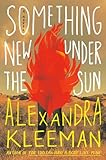 Here’s what Publishers Weekly had to say about Something New Under the Sun: “Kleeman’s ranging and ambitious latest (after Intimations) imagines a climate-ravaged near-future California. Novelist Patrick Hamlin has just arrived in Los Angeles to assist with the adaptation of his melancholy novel Elsinore Lane, based on his father’s death. Hollywood calculations, though, quickly distort the story beyond recognition. Worse, the producers have cast in the leading role unpredictable former child star Cassidy Carter, whose career is on the downturn. Even worse yet, Patrick is made a production assistant and tasked with chauffeuring the unpredictable Cassidy to and from set. Meanwhile, Patrick’s wife, Alison, who previously suffered a breakdown, takes her daughter to an Upstate New York eco-retreat; California has recently converted to using WAT-R, a synthetic water product; and green vans make rounds to pick up sufferers of a mysterious new dementia. Cassidy and Patrick are then drawn in by conspiracy theories involving a supposed link between WAT-R and Cassidy’s old show, Kassi Keene: Kid Detective, and Patrick streams episodes looking for clues. While a few plot twists are telegraphed, the action is propulsive and entertaining even as the horrors of climate change smolder around every corner. Readers will be captivated by this intelligent, rip-roaring story.”
Here’s what Publishers Weekly had to say about Something New Under the Sun: “Kleeman’s ranging and ambitious latest (after Intimations) imagines a climate-ravaged near-future California. Novelist Patrick Hamlin has just arrived in Los Angeles to assist with the adaptation of his melancholy novel Elsinore Lane, based on his father’s death. Hollywood calculations, though, quickly distort the story beyond recognition. Worse, the producers have cast in the leading role unpredictable former child star Cassidy Carter, whose career is on the downturn. Even worse yet, Patrick is made a production assistant and tasked with chauffeuring the unpredictable Cassidy to and from set. Meanwhile, Patrick’s wife, Alison, who previously suffered a breakdown, takes her daughter to an Upstate New York eco-retreat; California has recently converted to using WAT-R, a synthetic water product; and green vans make rounds to pick up sufferers of a mysterious new dementia. Cassidy and Patrick are then drawn in by conspiracy theories involving a supposed link between WAT-R and Cassidy’s old show, Kassi Keene: Kid Detective, and Patrick streams episodes looking for clues. While a few plot twists are telegraphed, the action is propulsive and entertaining even as the horrors of climate change smolder around every corner. Readers will be captivated by this intelligent, rip-roaring story.”
Blind Man’s Bluff by James Tate Hill
 Here’s what Publishers Weekly had to say about Blind Man’s Bluff: “Essayist Hill (Academy Gothic) shares a stirring if meandering story about losing his sight. At age 16, he was diagnosed with Leber’s hereditary optic neuropathy and deemed legally blind. When asked about what he can and can’t see, Hill writes, ‘The short answer is this: I don’t see what I directly look at.’ While his narrative sometimes digresses into tangents about unrelated childhood crushes and his mom’s Weight Watchers meetings, humor buoys his account as he lays bare his attempts hide his legal blindness in a sighted world. He’d arrive early for dates so he could be found first; memorized buttons on the microwave and the route to the convenience store; and even entered a creative writing program where classmates, unaware of his blindness, attributed his unapproachability to him being ‘an asshole.’ Eventually he met and married a fellow MFA student, but their relationship buckled under his denial about his disability (‘I will not help you hide your blindness from the world,’ his wife wrote to him before their divorce). In the wake of their split, Hill struggled to write about his condition—’the thought of readers… knowing I was blind, disabled, felt like the opposite of why I chose to be a writer’—but after finding love again, his reluctance gave way to self-acceptance. This moving account doesn’t disappoint.”
Here’s what Publishers Weekly had to say about Blind Man’s Bluff: “Essayist Hill (Academy Gothic) shares a stirring if meandering story about losing his sight. At age 16, he was diagnosed with Leber’s hereditary optic neuropathy and deemed legally blind. When asked about what he can and can’t see, Hill writes, ‘The short answer is this: I don’t see what I directly look at.’ While his narrative sometimes digresses into tangents about unrelated childhood crushes and his mom’s Weight Watchers meetings, humor buoys his account as he lays bare his attempts hide his legal blindness in a sighted world. He’d arrive early for dates so he could be found first; memorized buttons on the microwave and the route to the convenience store; and even entered a creative writing program where classmates, unaware of his blindness, attributed his unapproachability to him being ‘an asshole.’ Eventually he met and married a fellow MFA student, but their relationship buckled under his denial about his disability (‘I will not help you hide your blindness from the world,’ his wife wrote to him before their divorce). In the wake of their split, Hill struggled to write about his condition—’the thought of readers… knowing I was blind, disabled, felt like the opposite of why I chose to be a writer’—but after finding love again, his reluctance gave way to self-acceptance. This moving account doesn’t disappoint.”
The President and the Frog by Carolina De Robertis
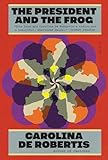 Here’s what Publishers Weekly had to say about The President and the Frog: “De Robertis (Cantoras) meditates on the fight for democracy in her pleasing latest. An unnamed 82-year-old former president of a ‘near-forgotten’ Latin American country ‘at the bottom of the world’ answers a journalist’s probing questions: How did the former guerrilla fighter rise from obscurity and imprisonment to become ‘The Poorest President in the World,’ and how can his country serve as an international symbol of hope? As he considers his replies, he recalls lessons from his darkest hours: 40 years before, he was captured after a failed revolution and condemned to isolation in a dirty pit, where his only companion was a talking frog. To satisfy the creature’s demand for ‘true stories,’ the narrator recalls memories that inspired his love of his country and his care for its people, such as strangers coming together during the initial military crackdowns to dig underground tunnels and free prisoners. Though he understands the frog is a manifestation of madness, the president ruminates on the sacrifices of the poor and abuses of the powerful as the narrative strands of past and present become one. While the allegorical aspects can feel a bit pat, the tale’s simplicity belies considerable depth and resonance: ‘Even horror is an opening, every moment a new beginning, until we reach the end.’ In such a charged political moment, this lands as both a balm and a paean to national pride and unity.”
Here’s what Publishers Weekly had to say about The President and the Frog: “De Robertis (Cantoras) meditates on the fight for democracy in her pleasing latest. An unnamed 82-year-old former president of a ‘near-forgotten’ Latin American country ‘at the bottom of the world’ answers a journalist’s probing questions: How did the former guerrilla fighter rise from obscurity and imprisonment to become ‘The Poorest President in the World,’ and how can his country serve as an international symbol of hope? As he considers his replies, he recalls lessons from his darkest hours: 40 years before, he was captured after a failed revolution and condemned to isolation in a dirty pit, where his only companion was a talking frog. To satisfy the creature’s demand for ‘true stories,’ the narrator recalls memories that inspired his love of his country and his care for its people, such as strangers coming together during the initial military crackdowns to dig underground tunnels and free prisoners. Though he understands the frog is a manifestation of madness, the president ruminates on the sacrifices of the poor and abuses of the powerful as the narrative strands of past and present become one. While the allegorical aspects can feel a bit pat, the tale’s simplicity belies considerable depth and resonance: ‘Even horror is an opening, every moment a new beginning, until we reach the end.’ In such a charged political moment, this lands as both a balm and a paean to national pride and unity.”
Savage Tongues by Azareen Van der Vliet Oloomi
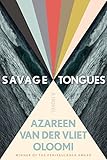 Here’s what Publishers Weekly had to say about Savage Tongues: “The narrator of Whiting Award–winner Oloomi’s uneven cerebral latest (after Call Me Zebra) reconsiders a relationship she had as a teenager with an older man. Writer Arezu returns from the U.S. to an apartment in Marbella, Spain, where she lived 20 years earlier, when she was 17. During that ‘strange, wild summer,’ she had an all-consuming sexual relationship with the 40-year-old Omar, whom she describes as ‘my lover, my torturer, my confidant and enemy.’ Her best friend, Ellie, flies in to help Arezu process her emotions (as with the friends’ past ‘recovery journeys,’ the pair seek to ‘reverse the language-destroying effects of unbearable pain’). The plot mostly stays put—Arezu swims, the women go out at night, Ellie does a tarot reading—with the narrative focused on Arezu’s inner turmoil. While her self-analysis effectively conveys her anguish and Omar’s manipulation and emotional abuse, the prose is often stilted (‘The injustices he’d assailed against me… could not be contained in a single temporal dimension’). Musings on Middle Eastern politics, including a trip to Israel and occupied Palestine with Ellie, add insight, but in the end, the weighty themes are sunk by portentous delivery. Readers can take a pass.”
Here’s what Publishers Weekly had to say about Savage Tongues: “The narrator of Whiting Award–winner Oloomi’s uneven cerebral latest (after Call Me Zebra) reconsiders a relationship she had as a teenager with an older man. Writer Arezu returns from the U.S. to an apartment in Marbella, Spain, where she lived 20 years earlier, when she was 17. During that ‘strange, wild summer,’ she had an all-consuming sexual relationship with the 40-year-old Omar, whom she describes as ‘my lover, my torturer, my confidant and enemy.’ Her best friend, Ellie, flies in to help Arezu process her emotions (as with the friends’ past ‘recovery journeys,’ the pair seek to ‘reverse the language-destroying effects of unbearable pain’). The plot mostly stays put—Arezu swims, the women go out at night, Ellie does a tarot reading—with the narrative focused on Arezu’s inner turmoil. While her self-analysis effectively conveys her anguish and Omar’s manipulation and emotional abuse, the prose is often stilted (‘The injustices he’d assailed against me… could not be contained in a single temporal dimension’). Musings on Middle Eastern politics, including a trip to Israel and occupied Palestine with Ellie, add insight, but in the end, the weighty themes are sunk by portentous delivery. Readers can take a pass.”
Radiant Fugitives by Nawaaz Ahmed
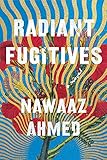 Here’s what Publishers Weekly had to say about Radiant Fugitives: “This dazzling, heartrending debut follows two Indian sisters and their mother as they work to patch up fractures in their family. In 2010, pregnant Seema Hussein, 40, hosts her terminally ill mother, Nafeesa, from Chennai, and her devoutly Muslim doctor sister, Tahera, from Irvine, Tex. Seema’s father disowned her when she came out as a lesbian, and the visit is a tentative step to mend fences as she frets about the birth and how involved in mothering she wants her younger Chinese American lover to be. The narration, artfully and convincingly handled from the point of view of Seema’s son, Ishraaq, moves backward to 2003, when Seema meets 34-year-old Bill Miles, a Black lawyer, at an anti-war protest and is disarmed by his ‘princely masculine courting.’ They marry, and Seema throws herself into work for political campaigns. Then, while going through a divorce with Bill, Seema discovers she is pregnant. Back in the present, Nafeesa plans an elaborate meal for Seema’s friends, while Tahera learns troubling details of anti-Muslim activity back home and struggles to reconcile her religious views with her role as a sister. Ahmed brilliantly maps the tension between the three women with emotional acuity, and as Seema’s pregnancy unfolds, Ahmed slowly builds to a showdown, culminating in a shattering and unforgettable conclusion. This is a gem.”
Here’s what Publishers Weekly had to say about Radiant Fugitives: “This dazzling, heartrending debut follows two Indian sisters and their mother as they work to patch up fractures in their family. In 2010, pregnant Seema Hussein, 40, hosts her terminally ill mother, Nafeesa, from Chennai, and her devoutly Muslim doctor sister, Tahera, from Irvine, Tex. Seema’s father disowned her when she came out as a lesbian, and the visit is a tentative step to mend fences as she frets about the birth and how involved in mothering she wants her younger Chinese American lover to be. The narration, artfully and convincingly handled from the point of view of Seema’s son, Ishraaq, moves backward to 2003, when Seema meets 34-year-old Bill Miles, a Black lawyer, at an anti-war protest and is disarmed by his ‘princely masculine courting.’ They marry, and Seema throws herself into work for political campaigns. Then, while going through a divorce with Bill, Seema discovers she is pregnant. Back in the present, Nafeesa plans an elaborate meal for Seema’s friends, while Tahera learns troubling details of anti-Muslim activity back home and struggles to reconcile her religious views with her role as a sister. Ahmed brilliantly maps the tension between the three women with emotional acuity, and as Seema’s pregnancy unfolds, Ahmed slowly builds to a showdown, culminating in a shattering and unforgettable conclusion. This is a gem.”
The Luminous Novel by Mario Levrero (translated by Annie McDermott)
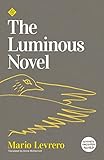 Here’s what Publishers Weekly had to say about The Luminous Novel: “The puzzling second work in English from the late Uruguayan author Levrero (1940–2004, after Empty Words) follows a 60-year-old writer named Mario who’s just received a Guggenheim grant. Mario begins keeping a diary until he feels ready to return to what he describes as a ‘luminous novel,’ which he started 16 years earlier, but never finished. Mario can’t sleep; he plays computer games and downloads pornography; tries to quit smoking and using the computer so much; records and analyzes his dreams; reads detective novels; laments the heat; and more than anything, bemoans that his relationship with ‘beautiful and seductive’ Chl is no longer sexual, even though she still brings him food and occasionally spends the night. What Mario does not do, until nearly a year later, is write the novel, which mainly recounts the women he slept with. Indeed, Mario believes that ‘these days a novel is practically anything you can put between a front and back cover.’ It’s a credible documentation of writer’s block and narcissism, but readers will be left wondering what purpose it serves. This is literature in the same way that John Cage’s 4’33” is music.”
Here’s what Publishers Weekly had to say about The Luminous Novel: “The puzzling second work in English from the late Uruguayan author Levrero (1940–2004, after Empty Words) follows a 60-year-old writer named Mario who’s just received a Guggenheim grant. Mario begins keeping a diary until he feels ready to return to what he describes as a ‘luminous novel,’ which he started 16 years earlier, but never finished. Mario can’t sleep; he plays computer games and downloads pornography; tries to quit smoking and using the computer so much; records and analyzes his dreams; reads detective novels; laments the heat; and more than anything, bemoans that his relationship with ‘beautiful and seductive’ Chl is no longer sexual, even though she still brings him food and occasionally spends the night. What Mario does not do, until nearly a year later, is write the novel, which mainly recounts the women he slept with. Indeed, Mario believes that ‘these days a novel is practically anything you can put between a front and back cover.’ It’s a credible documentation of writer’s block and narcissism, but readers will be left wondering what purpose it serves. This is literature in the same way that John Cage’s 4’33” is music.”
Once There Were Wolves by Charlotte McConaghy
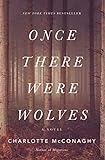 Here’s what Publishers Weekly had to say about Once There Were Wolves: “Australian author McConaghy (Migrations) returns with a vividly realized story of trauma and the attempted ‘rewilding’ of the Scottish Highlands. Empathetic biologist Inti Flynn, raised in part in Sydney, Australia, and in part in the woods of British Columbia, is on a project site in Scotland with a group of biologists, where she works to introduce North American wolves into the Scottish ecosystem. She has brought her mute identical twin sister, Aggie; Inti knows the source of Aggie’s trauma, but the details are kept from the reader until late in the narrative. When Inti discovers the body of a man she suspects was abusive to his wife (he said she fell off of a horse; she looked like she was beaten up), and who might have been killed either by a wolf or another person, she impulsively buries the body and sets out to solve the mystery of the death, a process complicated by her sexual relationship with the local police chief, as they have a hard time trusting each other, and by an unexpected pregnancy. In a story full of subtle surprises, revolving around Aggie’s painful past as well as the source of the violence on the project site, McConaghy brings precise descriptions to the wolves—’subtly powerful, endlessly patient’—and to Inti’s borderline-feral way of existing in the world. The bleak landscape is gorgeously rendered and made tense by its human and animal inhabitants, each capable of killing. Throughout, McConaghy avoids melodrama by maintaining a cool matter-of-factness. This is a stunner.”
Here’s what Publishers Weekly had to say about Once There Were Wolves: “Australian author McConaghy (Migrations) returns with a vividly realized story of trauma and the attempted ‘rewilding’ of the Scottish Highlands. Empathetic biologist Inti Flynn, raised in part in Sydney, Australia, and in part in the woods of British Columbia, is on a project site in Scotland with a group of biologists, where she works to introduce North American wolves into the Scottish ecosystem. She has brought her mute identical twin sister, Aggie; Inti knows the source of Aggie’s trauma, but the details are kept from the reader until late in the narrative. When Inti discovers the body of a man she suspects was abusive to his wife (he said she fell off of a horse; she looked like she was beaten up), and who might have been killed either by a wolf or another person, she impulsively buries the body and sets out to solve the mystery of the death, a process complicated by her sexual relationship with the local police chief, as they have a hard time trusting each other, and by an unexpected pregnancy. In a story full of subtle surprises, revolving around Aggie’s painful past as well as the source of the violence on the project site, McConaghy brings precise descriptions to the wolves—’subtly powerful, endlessly patient’—and to Inti’s borderline-feral way of existing in the world. The bleak landscape is gorgeously rendered and made tense by its human and animal inhabitants, each capable of killing. Throughout, McConaghy avoids melodrama by maintaining a cool matter-of-factness. This is a stunner.”
The Perfume Thief by Timothy Schaffert
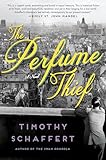 Here’s what Publishers Weekly had to say about The Perfume Thief: “Schaffert’s intoxicating blend of decadence and intrigue (after The Swan Gondola) brings Nazi-occupied Paris vividly to life. Narrator Clementine, a gender-fluid American expatriate in her 70s, is a perfumer and former thief who embraces the transgressive habitués of the city’s bordellos and cabarets. When a singer friend asks Clementine to steal the hidden diary of her father, the world-renowned perfumer Pascal, from the house the Nazis ejected them from, Clementine hopes to kill two birds with one stone: keep Pascal’s perfume formula out of his enemies’ hands, and take possession herself of his trade secrets, some of which she believes he stole from her. To achieve her goal, Clementine turns latter-day Scheherazade, stringing along Pascal’s Nazi usurper, bureaucrat Oskar Voss, while unfurling a running account of her colorful and queer personal history as she searches the perfumer’s premises. Schaffert’s evocation of Paris and its wartime demimonde is sensual and alluring, but the heart of his novel is Clementine’s demonstration through her own adventures of how every life is its own heady perfume, distilled from the personal experiences of the individual. This is a rich and rewarding tale, as original and unique as the handiwork of its eponymous character.”
Here’s what Publishers Weekly had to say about The Perfume Thief: “Schaffert’s intoxicating blend of decadence and intrigue (after The Swan Gondola) brings Nazi-occupied Paris vividly to life. Narrator Clementine, a gender-fluid American expatriate in her 70s, is a perfumer and former thief who embraces the transgressive habitués of the city’s bordellos and cabarets. When a singer friend asks Clementine to steal the hidden diary of her father, the world-renowned perfumer Pascal, from the house the Nazis ejected them from, Clementine hopes to kill two birds with one stone: keep Pascal’s perfume formula out of his enemies’ hands, and take possession herself of his trade secrets, some of which she believes he stole from her. To achieve her goal, Clementine turns latter-day Scheherazade, stringing along Pascal’s Nazi usurper, bureaucrat Oskar Voss, while unfurling a running account of her colorful and queer personal history as she searches the perfumer’s premises. Schaffert’s evocation of Paris and its wartime demimonde is sensual and alluring, but the heart of his novel is Clementine’s demonstration through her own adventures of how every life is its own heady perfume, distilled from the personal experiences of the individual. This is a rich and rewarding tale, as original and unique as the handiwork of its eponymous character.”
When the Reckoning Comes by LaTanya McQueen
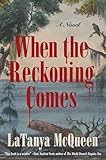 Here’s what Publishers Weekly had to say about When the Reckoning Comes: “McQueen’s arresting debut novel (after the essay collection And It Begins Like This) features a vengeance-fueled ghost story on a former tobacco plantation. Mira, a Black high school teacher in present-day Winston-Salem, N.C., fled her segregated hometown of Kipsen on a college scholarship, leaving behind her close friend and love interest Jesse and their friend Celine, who is white. McQueen shuffles Mira’s flashbacks to high school with passages describing memories of the enslaved people who haunt the Woodsman plantation, unfurling a fateful night when the friends trespassed on the plantation ruins and Jesse was suspected of murder after the body of a white man was found nearby. A decade later, Celine invites Mira to Celine’s wedding at the renovated plantation, which has been turned into a resort and tourist attraction, defending her choice against Mira’s objections: ‘It hasn’t been a plantation for over a hundred years, and it’s not like my family owned slaves.’ But many of the guests’ ancestors did, which doesn’t bode well for them on the ghosts’ turf. Readers might lose their suspension of disbelief at certain supernatural moments, but McQueen does a good job balancing the various timelines to show how a place can be haunted by living history. This leaves readers with much to consider.”
Here’s what Publishers Weekly had to say about When the Reckoning Comes: “McQueen’s arresting debut novel (after the essay collection And It Begins Like This) features a vengeance-fueled ghost story on a former tobacco plantation. Mira, a Black high school teacher in present-day Winston-Salem, N.C., fled her segregated hometown of Kipsen on a college scholarship, leaving behind her close friend and love interest Jesse and their friend Celine, who is white. McQueen shuffles Mira’s flashbacks to high school with passages describing memories of the enslaved people who haunt the Woodsman plantation, unfurling a fateful night when the friends trespassed on the plantation ruins and Jesse was suspected of murder after the body of a white man was found nearby. A decade later, Celine invites Mira to Celine’s wedding at the renovated plantation, which has been turned into a resort and tourist attraction, defending her choice against Mira’s objections: ‘It hasn’t been a plantation for over a hundred years, and it’s not like my family owned slaves.’ But many of the guests’ ancestors did, which doesn’t bode well for them on the ghosts’ turf. Readers might lose their suspension of disbelief at certain supernatural moments, but McQueen does a good job balancing the various timelines to show how a place can be haunted by living history. This leaves readers with much to consider.”
Agatha of Little Neon by Claire Luchette
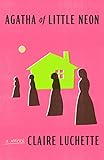 Here’s what Publishers Weekly had to say about Agatha of Little Neon: “A quartet of nuns navigates unexpected changes in Luchette’s dynamic and resonant debut. Frances, Mary Lucille, Therese, and narrator Agatha are transferred to a Rhode Island halfway house called Little Neon that’s painted the ‘chemical, lurid’ color of Mountain Dew and houses a collective of eccentric characters such as Lawnmower Jill, who drove drunk too many times and now resorts to driving the vehicle from which her nickname is derived. Luchette profiles the nuns with crisp precision, portraying their leader Mother Roberta as a tinderbox of nerves and pent-up frustrations who is angry that ‘the church she’d loved all her life was reluctant to change’; noting the sisters’ ‘ovarian synchrony’; and describing the secretly gay Agatha’s observation of two girls kissing in her classroom (she also teaches at a local high school) as ‘moving their heads the way pigeons do.’ As Agatha builds confidence while giving geometry lessons, she and her sisters are challenged by the home’s residents’ judgments of their biblical teachings, such as one who claims the story of Noah’s ark is about ‘how God hates gay people.’ Employing short, clipped chapters and shimmering prose, Luchette garnishes each scene with tender and nuanced descriptions of longing and chastity, creating a lovely story of how cross-cultural exchange can foster hope and fruitful advancements. This is charming and remarkably thoughtful.”
Here’s what Publishers Weekly had to say about Agatha of Little Neon: “A quartet of nuns navigates unexpected changes in Luchette’s dynamic and resonant debut. Frances, Mary Lucille, Therese, and narrator Agatha are transferred to a Rhode Island halfway house called Little Neon that’s painted the ‘chemical, lurid’ color of Mountain Dew and houses a collective of eccentric characters such as Lawnmower Jill, who drove drunk too many times and now resorts to driving the vehicle from which her nickname is derived. Luchette profiles the nuns with crisp precision, portraying their leader Mother Roberta as a tinderbox of nerves and pent-up frustrations who is angry that ‘the church she’d loved all her life was reluctant to change’; noting the sisters’ ‘ovarian synchrony’; and describing the secretly gay Agatha’s observation of two girls kissing in her classroom (she also teaches at a local high school) as ‘moving their heads the way pigeons do.’ As Agatha builds confidence while giving geometry lessons, she and her sisters are challenged by the home’s residents’ judgments of their biblical teachings, such as one who claims the story of Noah’s ark is about ‘how God hates gay people.’ Employing short, clipped chapters and shimmering prose, Luchette garnishes each scene with tender and nuanced descriptions of longing and chastity, creating a lovely story of how cross-cultural exchange can foster hope and fruitful advancements. This is charming and remarkably thoughtful.”
All’s Well by Mona Awad
 Here’s what Publishers Weekly had to say about All’s Well: “The pill-addled theater professor at the center of Awad’s scathing if underwhelming latest (after Bunny) is nearing the end of her rope. Miranda Fitch passes her days in a self-medicated haze, numbing the debilitating pain she’s felt since falling off the stage in a production of Shakespeare’s All’s Well That Ends Well. Worse still, no one seems to believe the severity of her condition. After the cast of her student production insists on putting on Macbeth rather than All’s Well, Miranda is approached at a bar by three mysterious men who give her the ability to transfer her pain to others. In the first instance, she wrests a script from a mutinous student, who then clutches her wrist in pain where Miranda touched her. Eventually, Miranda’s elation at escaping her pain gives way to a dangerously vindictive, manic spiral. Awad’s novel is, like Miranda says about Shakespeare’s All’s Well, ‘neither a tragedy nor a comedy, something in between.’ Unfortunately, it falls short on both counts: Miranda’s acerbic inner monologue reaches for humor but mostly misses, and the overwrought tone undermines the story’s tragedy (when asked why she wanted to teach at the college: ‘I thought: Because my dreams have been killed. Because this is the beginning of my end’). It’s an ambitious effort, but not one that pays off.”
Here’s what Publishers Weekly had to say about All’s Well: “The pill-addled theater professor at the center of Awad’s scathing if underwhelming latest (after Bunny) is nearing the end of her rope. Miranda Fitch passes her days in a self-medicated haze, numbing the debilitating pain she’s felt since falling off the stage in a production of Shakespeare’s All’s Well That Ends Well. Worse still, no one seems to believe the severity of her condition. After the cast of her student production insists on putting on Macbeth rather than All’s Well, Miranda is approached at a bar by three mysterious men who give her the ability to transfer her pain to others. In the first instance, she wrests a script from a mutinous student, who then clutches her wrist in pain where Miranda touched her. Eventually, Miranda’s elation at escaping her pain gives way to a dangerously vindictive, manic spiral. Awad’s novel is, like Miranda says about Shakespeare’s All’s Well, ‘neither a tragedy nor a comedy, something in between.’ Unfortunately, it falls short on both counts: Miranda’s acerbic inner monologue reaches for humor but mostly misses, and the overwrought tone undermines the story’s tragedy (when asked why she wanted to teach at the college: ‘I thought: Because my dreams have been killed. Because this is the beginning of my end’). It’s an ambitious effort, but not one that pays off.”
